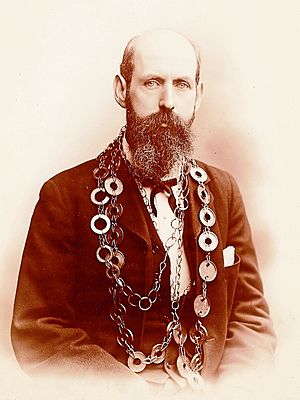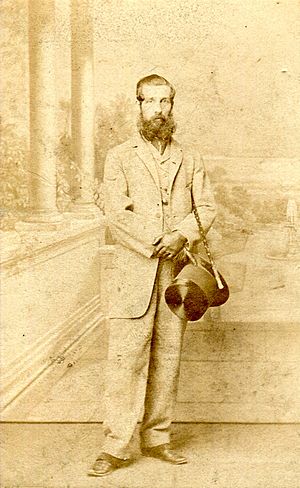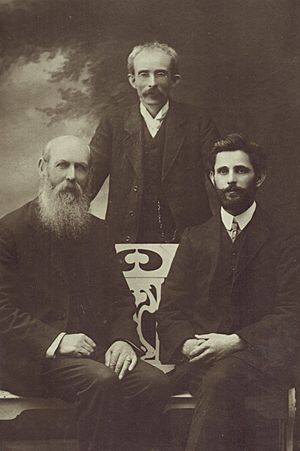John Daly (Fenian) facts for kids
Quick facts for kids
John Daly
Seán Ó Dálaigh |
|
|---|---|

Daly as the Mayor of Limerick, c. 1900
|
|
| Member of Parliament | |
| In office August 1895 – 1895 |
|
| Preceded by | Francis Arthur O'Keefe |
| Succeeded by | Francis A. O'Keefe |
| Constituency | Limerick City |
| Mayor of Limerick | |
| In office 1899–1901 |
|
| Preceded by | Michael Cusack |
| Succeeded by | James F. Barry |
| Personal details | |
| Born | 18 October 1845 Limerick City, County Limerick, Ireland |
| Died | 30 June 1916 (aged 70) Ireland |
| Political party | Irish National League |
| Relatives | Ned Daly Kathleen Clarke |
| Military service | |
| Allegiance | Irish Republican Brotherhood |
| Battles/wars | Fenian Rising of 1867 |
John Daly (born October 18, 1845 – died June 30, 1916) was an important Irish leader. He was a key member of the Irish Republican Brotherhood, a group that wanted Ireland to be independent. John Daly was the uncle of Kathleen Clarke, whose husband, Tom Clarke, was a leader in the 1916 Easter Rising. John's nephew, Ned Daly, was also involved in the Rising. John Daly himself served as the Mayor of Limerick for three years.
Contents
Early Life and Joining the Fenians
John Daly was born in Limerick city, Ireland, on October 18, 1845. His father worked in a timber yard. When John was 16, he started working there too.
At 18, he joined the Irish Republican Brotherhood, also known as the Fenians. This group worked for Irish independence. John became very active in their plans.
In November 1866, John and his brother Edward were arrested. They were accused of running a secret workshop for supplies near their home. John was released a few months later, more determined than ever.
The 1867 Fenian Rising
On March 5, 1867, the Fenian Rising began. John Daly led the Fenian group in Limerick. Limerick was one of the few places where the Fenians showed some strength.
However, they didn't have enough people to fight the much larger British forces. Daly and his men left the city and joined other Fenians. They tried to attack a police station in Kilmallock.
The attack failed, and Daly told his men to scatter. After this, John Daly had to escape Ireland. He secretly traveled on a boat to England, then to the United States of America.
Life in America
Life was hard for working-class immigrants in America. John Daly's first job was digging a cellar. He then worked in a factory and as a helper for a builder.
Later, he got a better job as a brakeman on a tram system. Daly later wrote about these experiences in his book, Recollections of Fenians and Fenianism.
Fighting for Prisoners' Rights
In 1869, John Daly returned to Ireland. He went back to his old job and continued his work with the Fenians. He helped to reorganize the group.
Daly became a strong voice in the Amnesty Association. This group worked to free Fenians who were still in jail.
In November 1869, a large meeting was planned in Limerick. The Fenians didn't like it because it didn't focus on freeing the prisoners. Daly and the Fenians broke up the meeting. He felt it was a big victory for their cause.
John Daly spent much of the 1870s working for the release of political prisoners. In 1876, he was arrested again but was found not guilty.
Arrest and Time in Prison
In 1883, John Daly moved to Birmingham, England. British police were watching him closely. They used secret agents to try and catch Republicans.
One agent convinced Daly to deliver some sealed cases to London. On April 11, Daly was arrested as he was about to board a train. Police said they found explosives in the case he was carrying.
While in Chatham prison, Daly became friends with Tom Clarke. Tom later married John's niece, Kathleen Clarke. Tom Clarke became a leader of the 1916 Easter Rising.
While in prison, Daly claimed he was being harmed. This led to an investigation. Prison officials admitted there had been a mistake by a guard.
Release and Public Life
In July 1895, John Daly was elected as a Member of Parliament (MP) for Limerick City. He was part of the Irish National League. However, he was not allowed to serve as an MP because of his past charges.
In 1896, he went on a speaking tour in England with Maud Gonne. In 1897, he toured America. Later, he started a successful bakery business in Limerick. He then became the Mayor of his home city.
Serving as Mayor of Limerick
John Daly was elected as the Mayor of Limerick City three times. He served from 1899 to 1901. In 1910, he helped fund Irish Freedom, a newspaper for the Irish Republican Brotherhood.
The Daly Cup
In 1928, Madge Daly, who was John Daly's niece, gave a special trophy to the Limerick GAA county board. This trophy is called the Daly Cup. Today, the Daly Cup is given to the winners of the Limerick Senior Hurling Championship.
Images for kids
 | Laphonza Butler |
 | Daisy Bates |
 | Elizabeth Piper Ensley |





